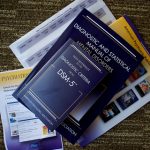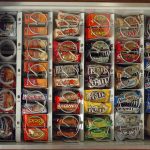Lifestyle

The latest revision of the psychiatric diagnostic manual, the DSM-5, is now being used by clinicians. In it are a few changes to the way eating disorders will be assessed and diagnosed. The most significant change to the eating disorder category is the official recognition of binge eating disorder as a stand-alone diagnosis. There are …
Read More

October is National Domestic Violence Awareness Month, and it is often ignored that the trauma caused by abuse can be a significant factor in developing an eating disorder. One thing eating disorder and abuse victims have in common is a need for control. For those suffering from an eating disorder, the need for control does …
Read More

Although they share several behaviors, there are definite differences between dieting and having an eating disorder. Looking at those differences may clear up any confusion you have about whether you or someone you know is dieting or has a diagnosis. The best thing to do, if you are worried about yourself, is to talk to …
Read More

Many young women who develop Type 1 diabetes experience rapid weight loss as a result of the body’s inability to produce insulin and to use food for energy. With a diagnosis of diabetes and subsequent insulin injections, these women regain the weight lost, and sometimes a little more. Diabulimia refers to the dangerous manipulation of …
Read More

Trying to control our actions does not lead to increased self-control; however, we can put effort into cultivating the skills that are the foundation of self-control. Research has shown that practicing self-awareness and self-care, as well as reminding ourselves what we value, enhances the ability to choose our actions. “These three skills – self-awareness, self-care, …
Read More

Receiving criticism is unavoidable. People may criticize us directly, by giving advice, teaching us when we do not require it, comparing us negatively to someone else, correcting us or focusing our attention a single fault. Sometimes it rolls off our back or we manage to take it with good grace. Other times, it is piercingly …
Read More

Consuming fats and oils that are stored in the body as fat is a daunting issue for someone with an eating disorder. If this is true for you, consider switching to coconut oil for cooking and baking. The body needs high-quality fat to function properly, and coconut oil is just that. It is made of …
Read More

Looking good as we go about our business in the world has more to do with wearing clothes that fit us well than having an ideal body. If our clothes are sized correctly and are items we feel good about wearing, they will support our confidence and self-esteem. Choosing Clothes That Fit: 8 Tips When …
Read More

Getting support for your eating disorder is essential to recovery. But when there are no resources available to you, it can make the process much more difficult. The Culture of Thin Although anorexia and bulimia are conditions that affect people across the globe, these disorders have not been pressing problems for Asian countries like China …
Read More

Cane sugar and high-fructose corn syrup both sweeten food, add calories to our diet, and, in large amounts, are harmful to our health. What differentiates the two sugars is how they break down during digestion and affect metabolism and hormone balance. Where HFCS Comes From High-fructose corn syrup is a manufactured food product extracted from …
Read More
 Eating Disorder Self Test. Take the EAT-26 self test to see if you might have eating disorder symptoms that might require professional evaluation. All answers are confidential.
Eating Disorder Self Test. Take the EAT-26 self test to see if you might have eating disorder symptoms that might require professional evaluation. All answers are confidential.
Find a Treatment Facility Near You
Click on a state below to find eating disorder treatment options that could be right for you.










 Eating Disorder Self Test. Take the EAT-26 self test to see if you might have eating disorder symptoms that might require professional evaluation. All answers are confidential.
Eating Disorder Self Test. Take the EAT-26 self test to see if you might have eating disorder symptoms that might require professional evaluation. All answers are confidential.